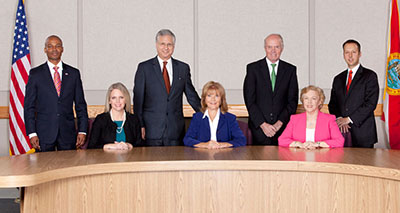The Palm Beach County Commission approved an ordinance Tuesday that creates a Property Assessed Clean Energy (PACE) program, giving homeowners a financing option for second mortgages or bank loans to pay for upgrades that involve energy savings or improved hurricane protection.
The commissioners directed staff last July to develop a countywide PACE program for owners of residential and commercial property, and this was the board’s final look at the result.
PACE programs provide financing for qualified energy efficiency, renewable energy and wind resistance improvements, which is repaid as an assessment on the property’s regular tax bill. The ordinance establishes requirements, including consumer protection standards, to ensure high-quality providers and programs, according to the staff report.
Climate Change & Sustainability Coordinator Natalie Schneider said the policy has numerous consumer protection provisions, but since the preliminary reading, county staff had added a requested provision that requires fixed, fee simple payments that fully amortize the obligation.
Schneider said PACE is a voluntary assessment that would go on people’s property taxes to help them pay for qualifying energy efficiency improvements, renewable energy and wind mitigation improvements.
Commissioner Mack Bernard spent about an hour grilling PACE providers about the details of financing and whether property owners were vulnerable to questionable financing procedures, interest rates or possible hidden fees. He was ultimately the sole dissenting vote in the approval.
Bernard asked how a person seeking PACE financing starts the process, and Rafael Perez with Ygrene Energy Fund Florida, one of four PACE financiers at the meeting, said property owners can go online or call, or a contractor can help them with the process.
Perez said PACE representatives can also give property owners a list of contractors that participate in the PACE program.
Bernard asked whether those reviewing the application find out if the homeowners are current on their mortgage, and Perez said that is a state requirement. He added that searches are also done for any outstanding liens or code violations before the assessment is approved.
Perez added that the assessment may be transferrable if the owner chooses to sell the home or refinance.
C.J. De Santis with the AllianceNRG Program, based in Boca Raton, said transferability of the assessment depends on who the primary lender is, but they have never had a problem in Florida.
Perez added that the potential borrower can walk away from the process at any time before the papers are signed, no matter what the lender may have invested along the way.
Commissioner Hal Valeche asked whether any research had been done on variable-rate loans, which can be significantly lower at times, and Schneider said the terms of the loans, since they are repaid through an assessment, makes that setup difficult.
“It is considered an assessment,” she said. “It’s not considered a loan.”
Schneider added that a property owner could refinance and pay off the assessment using conventional loan products that are readily available.
Bernard asked how interest rates and closing costs are controlled, and Perez said that the closing costs are similar to conventional loan fees.
“The closing fees are about the same across the board,” Perez said. “We’re not there to make money off that. Those are just the fees that are required to be able to make sure that we comply with the law.”
He added that all the fees are fully disclosed before closing.
Erin Deady with Renew Financial said the tax collector can collect up to 2 percent administrative fees for processing the assessment, and the total rate for the buyer will be somewhere between 6 and 8 percent, depending on the term of the loan.
Bernard said he had seen rates as high as 11 percent, and Schneider said administrative fees are usually 5 to 6 percent, which is commensurate with conventional loans.
Deady said the assessments will be authorized through interlocal agreements with local governments, special districts and lenders, and the special district phone numbers are what will appear on the taxpayers’ bill.
Palm Beach County Mayor Paulette Burdick pointed out that PACE is not a Palm Beach County program, and not a party to the special taxing districts that will administer the program.
Schneider said that a PACE window would be created on the county web site for people to get more information.
During public comment, Debbie Evans, a 40-year resident of Palm Beach County, said she lives in a home that was built in 1981.
“That’s a significant year because 1981 was the first year that the State of Florida enacted an energy code,” Evans said. “I have studied the proposed PACE ordinance and researched its implications. I appreciated all your questions. I learned today, but as a result, I do feel comfortable obtaining financing using PACE to make necessary improvements to my home. It simply gives me another financing option to consider.”
After additional discussion, Commissioner Melissa McKinlay made a motion to approve the final reading of the ordinance, which carried 6-1 with Bernard dissenting.








